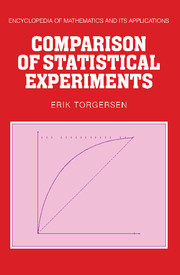Book contents
- Frontmatter
- Contents
- Preface
- Acknowledgments
- 1 Statistical experiments within the measure theoretical framework
- 2 Convexity
- 3 Two-person, zero-sum games
- 4 Statistical decision problems
- 5 Vector lattices
- 6 Deficiencies
- 7 Equivalence, representations and functionals of experiments
- 8 Comparison of linear models
- 9 Majorization and approximate majorization
- 10 Complements: Further examples, problems and comments
- List of symbols
- Author index
- Additional references
- Subject index
1 - Statistical experiments within the measure theoretical framework
Published online by Cambridge University Press: 05 May 2013
- Frontmatter
- Contents
- Preface
- Acknowledgments
- 1 Statistical experiments within the measure theoretical framework
- 2 Convexity
- 3 Two-person, zero-sum games
- 4 Statistical decision problems
- 5 Vector lattices
- 6 Deficiencies
- 7 Equivalence, representations and functionals of experiments
- 8 Comparison of linear models
- 9 Majorization and approximate majorization
- 10 Complements: Further examples, problems and comments
- List of symbols
- Author index
- Additional references
- Subject index
Summary
Introduction
This chapter is intended to serve several purposes. Firstly it contains tools which will be used throughout this work. Thus several of the basic concepts are introduced. Some of the definitions are repeated in later chapters, but others are only given here. It is not necessary to have acquired an understanding of everything here in order to proceed. Indeed some of the material in this chapter anticipates later developments and may not be fully comprehended before these developments have been studied. Thus the reader may just look over the chapter and later return to this material when the need arises.
Another purpose is to provide a self-contained introduction to some ideas which later will play a central role. Thus it is intended to be possible to go through this chapter before (or whilst) reading the later chapters.
A third purpose is to present some ‘classical’ material which is important as background for the theory of statistical experiments as it is presented here. In particular some of this material indicates the need of extending, as LeCam did, the measure theoretical framework of decision theory.
The notion of a statistical experiment (statistical model) is introduced in section 2. It is argued there that the usual notion of a statistic as a random variable is too narrow and that it should be extended to the more general concept of a consistent family. The optimistic goal is to make everything as simple (or difficult) as it is in the ‘finite’ case. Difficulties beyond the finite case may then be considered as being of technical nature.
- Type
- Chapter
- Information
- Comparison of Statistical Experiments , pp. 1 - 78Publisher: Cambridge University PressPrint publication year: 1991



